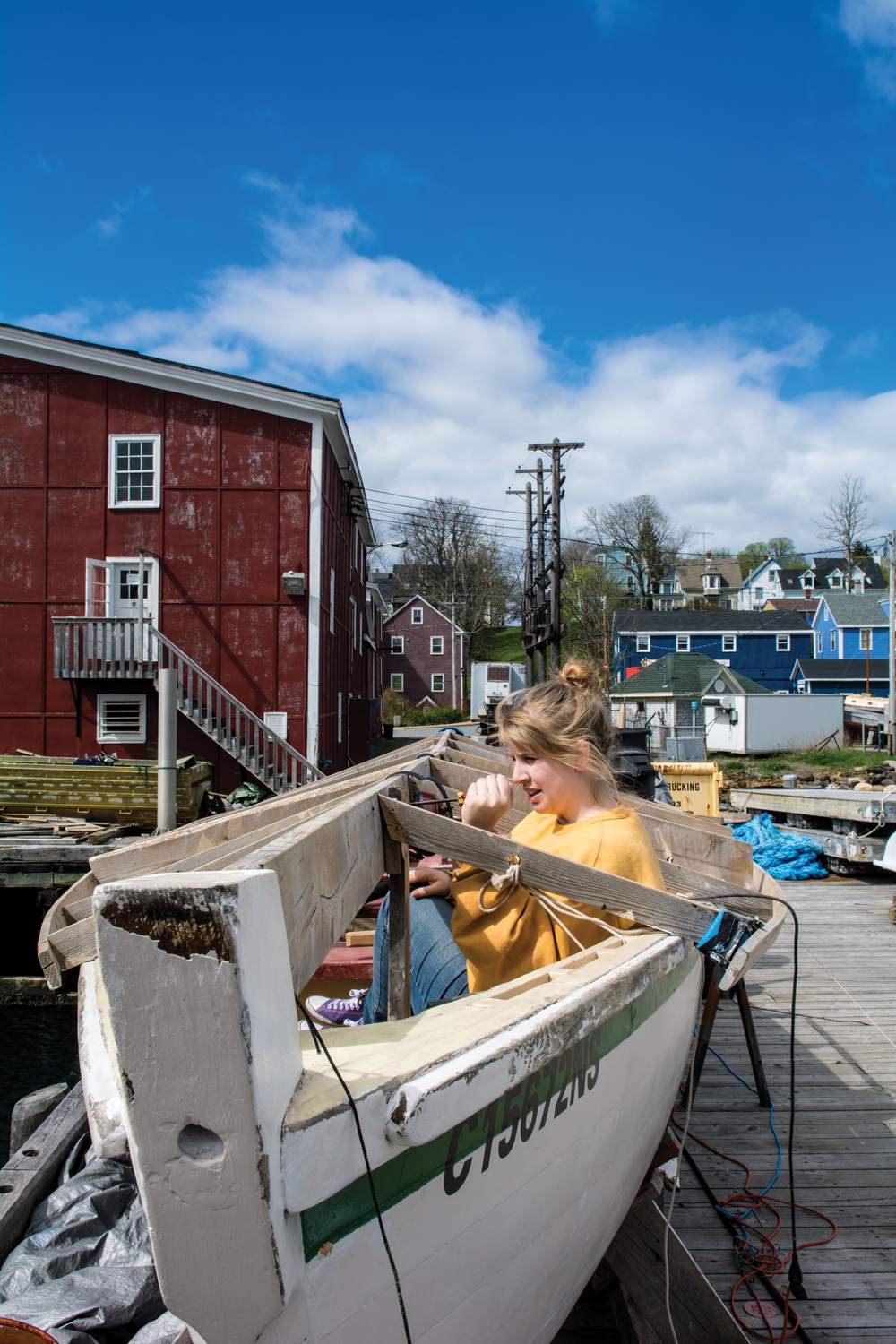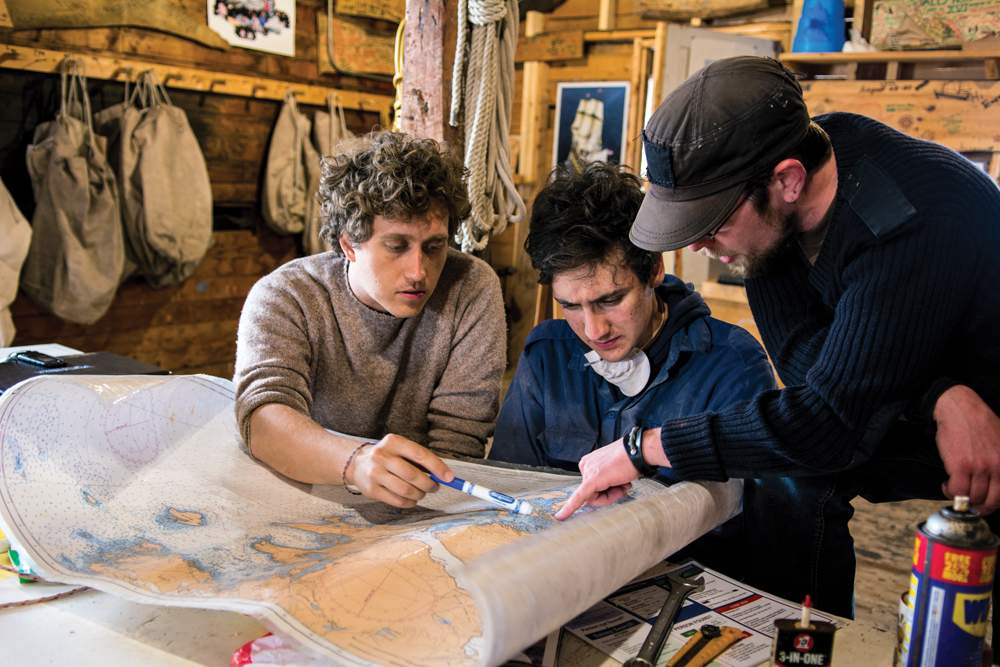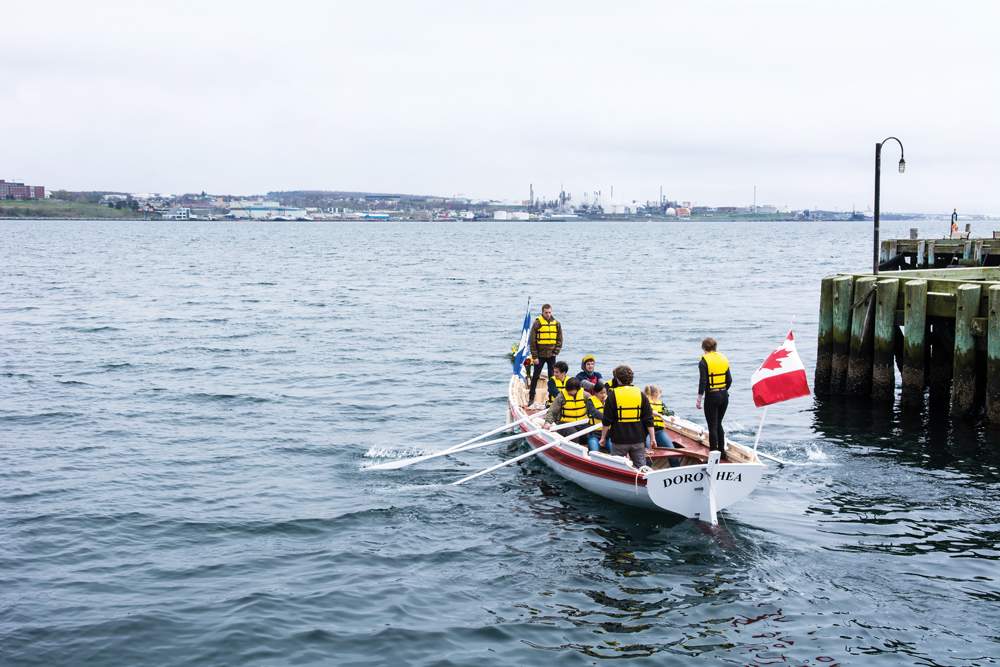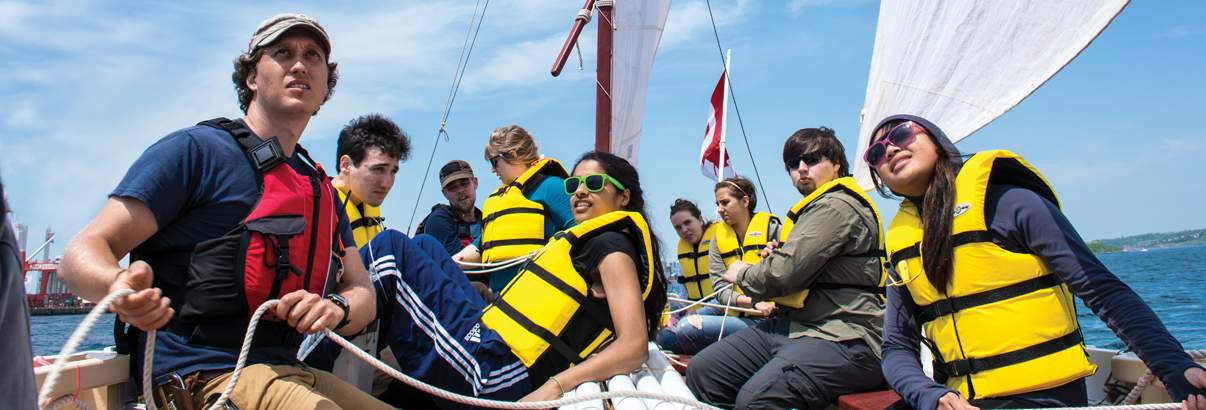One July morning in the colorful fishing village of Lunenburg, Nova Scotia, 10 teenagers gather on the dock to prepare for a voyage.
The rain is pouring down, dampening the gear, if not the spirits, of the young people about to embark on the adventure of their young lifetimes.
But first, in order to pack in their stuff—personal belongings, food, water, and sleeping bags—they have to pump the rainwater out of the bilge of the Elizabeth Hall, a 30-foot whaler-style traditional wooden sailing ship open to the elements.
They meet their instructors and captain. They listen to a talk about lifejackets and safety equipment. They learn each other’s names.
Only after that can they board the boat, their home for the next five days, and start rowing for the open ocean.
This no-frills sea voyage—a life-changing experience for anyone, no matter what age—is much more than just an instructional on sailing. It’s a metaphor for the challenges they’ll navigate for the rest of their lives, a crash course in self-discovery for young people more accustomed to Facebook posts and high-school politics than jibing and tacking.
Many of these kids have no experience with sailing. They leave behind their smartphones and any other electronic gadgets—the only electronics allowed on board is a VHF radio instructors use for checking the weather forecast, a couple of navigational devices, and one phone, for emergency use only. Everyone sleeps on the oars, under a tarp to keep off the rain. The toilet? A small plywood box with a bucket inside, located in the bow of the boat. This trip is repeated with different teens a half dozen times each year by the Nova Scotia Sea School, based in Halifax, on Canada’s east coast. The trips range from 5 to 21 days.
“Before I went to sea school, sailing involved a lot of fear,” says Zoe Nudell, who took her first voyage in 1994 at age 14. Now she’s a captain, leading students through the same journey she came to love so much.
Unlike most teenagers who go on these voyages, Nudell had sailed before. But it hadn’t always been a good experience. “I feared doing things wrong, not being cool. I was also scared of the elements. And there is good reason for that. It’s really important to respect the ocean and the wind.”
Nudell was able to let go of her anxiety around sailing when she started at the sea school, understanding that the instructors were capable and invested in her safety. “What happened when I got to sea school was that I was allowed to make mistakes,” she says. “The elements were just as challenging and frightening, but I was a part of a crew. I finally found myself with people who wanted me to explore as much as possible. I could trust this situation and I could afford the mental space to be curious, to challenge myself to learn things.”
At the Nova Scotia Sea School, real life is the teacher. Instructors get out of the way and let things happen, but they never allow things to get out of control. That leaves room for teenagers to have fun together—sailing a boat on the open sea is about as exhilarating as it gets—but it also gives them something they crave even more: the opportunity to be in charge of their lives without repeated adult critique. It’s not an easy ride, though.
“At times I was wrapped in a sleeping bag, sheltering myself from mosquitoes in sweltering heat, while crammed between nine other teenagers,” remembers 18-year-old Claire Fraser, who took her first five-day voyage last July. It rained the first day, followed by a heat wave on the second day. It wasn’t easy to sleep on the slim mattress on top of oars that was her “bed” on the rocking boat. She wasn’t that comfortable using the “bathroom”—you conceal yourself, but still.
Added to all of the physical challenges was the fact that 10 teenagers had to work together as a single body. In the end, says Fraser, she liked it. A lot. “I liked learning with a group of people, not knowing everyone and not agreeing with everyone, but working together. It’s like being in a job with people you might not like, but you still have to work things out. I thought that was really cool. “When I first found out about the school,” Fraser adds, “I doubted I would enjoy being dirty for days or having very little privacy. But everyone is so respectful—after all, we’re all in the same boat anyways.” She’s keen to do it all again and is even toying with the idea of studying to become an instructor.

Carlo Myers, a 16-year-old on the same voyage, appreciated life in an open boat as well. He was surprised to find that despite the cramped quarters, “I never felt claustrophobic.”
The need to cooperate, to get along and create a microcosmic world together, is something kids learn pretty quickly. Nudell says, “You can’t just make a mean comment and walk down the hall and say, ‘See ya, loser.’ Oh no—now you have to cook dinner with the other person.
“In the same way, the state of your belongings becomes pretty important, too. If you don’t put your sleeping bag away properly and a big wave comes over the side, your sleeping bag is wet that night. And if you can’t get yourself out of bed in the morning, you inconvenience everybody.”
On the boat, nothing is taken for granted—even the basics require thought and planning. “You want to brush your teeth? You can’t just turn on the tap and grab your toothbrush. You have to fish it out from the bottom of this unbelievably irritating duffel bag,” says Nudell about a common on-board bag that’s designed without zippers, pockets, or compartments so things inside don’t get wet or drop out.
All of the irritations and inconveniences are just part of learning how important it is to pay attention to what’s going on around you: the sea, the weather, the equipment, the person next to you. The students quickly catch on that when you’re in an environment that makes you all vulnerable and dependent on one another, everybody needs to watch out for everyone else.
• • •
Sea school was a deeply formative experience for Philippe Inacio-Goetsch. He didn’t just learn how to sail a boat; he learned how to build one. In fact, he spent last winter rebuilding the school’s first boat, the Dorothea, which had originally been constructed by students. Those earlier students had helped choose the very timbers, harvested from local forests, for the build, and participated in all other phases of creating a seaworthy vessel. Inacio-Goetsch, who is now an instructor, also enlisted the help of current students to rebuild the Dorothea in a shop beside Halifax harbour.
The biggest thing you learn at sea school, says Inacio-Goetsch, is that when there’s no escape, you can find freedom and space. Students see how they can be aware of that space no matter what’s happening— periods of intense weather, tension on the boat, or just plain boredom.
“Things get real,” he says. “Things fall apart, tempers flare, and the students realize that they can have a good experience of it. They’re in control of what’s going on.”
There are daily routines on board that help students develop their awareness. To get the blood flowing, everyone takes a morning dip. Rain or shine, cold or not, everyone has to get into the water for a few minutes. Each day begins and ends with “outward turn,” where students silently look out at the horizon. It’s a practice designed to help everyone stop and shift their focus from the cramped, damp interior of the boat to the limitless sea and sky beyond the hull. Before beginning or ending any group activity on board, such as preparing food, everyone bows. Sailing is often done in silence, so everyone can, as Inacio-Goetsch puts it, “tune in to what’s going on.”

Throughout the day, students take turns at all of the nautical roles: taking the wheel and commanding the boat, working the ropes and sails, and rowing. Each day, the goal is to travel a predetermined route and find a cove or an island in order to lay anchor for the night in a protected area. Once that’s done, everyone prepares dinner. After cleanup, everyone arranges their sleeping bags side by side on top of the makeshift bedframe made by placing the oars between the bow and stern. The day ends with “candle talk”—an impromptu lantern made out of the top of a plastic soda bottle and a tall candle is passed from person to person. Whoever has the light takes a turn speaking.
It’s a chance to debrief about what people are feeling and thinking, says Inacio-Goetsch. “Everything gets talked about—what happened during the day, including anything tense or difficult; how to work better as a crew; or even how to change the world. It depends on the chemistry of who’s on the boat.”
At night, the students rotate on 45-minute shifts of night watch, keeping the well-being of sleeping crewmates in mind and watching for sudden changes in the weather. At daybreak, it all begins again.
• • •
Crane Stookey grew up in New York City and worked as an architect for eight years in Boston and San Francisco. He always loved sailing, so after taking a break from his profession—and working on oceangoing ships for four years—he decided in the early 1990s to change course and open a sailing school in Nova Scotia. Though some of the techniques used at the sea school are inspired by Outward Bound, they have been adapted to fit Stookey’s goal: helping students learn responsibility and creating a community in microcosm.
His original interest was sailing, but experiential education became his passion. “If I’d been in theatre we’d be doing plays, if I’d been into camping we’d be hiking in the woods, and if I’d been into math we’d have a math camp,” he says. “But we would essentially be doing the same thing. The fundamental practices of the sea school aren’t unique to sailing. But being out on the ocean is a particularly powerful place to be doing them.”
Stookey has carried what he’s learned in two decades at the sea school into corporate training work. He’s even had success leading the outward turn in meeting and training rooms, where executives face away from each other and pause. His book about ways to cultivate a more engaged workforce, Keep Your People in the Boat, brings a more meditative element to the truism of sailing as a metaphor for navigating life.
“I have a lot of faith in the power of stopping,” he says. “In a way, a sea school expedition is a huge stop. Students stop relying on all the things they think their life depends on—physical comforts, TV, the Internet, the approval of their peers. They learn to appreciate the value of taking a real break. There’s nothing radical in that idea. We all know what it feels like to take a deep breath and make a fresh start.”
Zoe Nudell says that taking a break from regular life is an essential part of why teenagers take to the sea school. The way she sees it, what they all have in common is a feeling of being fundamentally uncertain and unsafe. “They’re all desperate for validation, afraid they’re not good enough, not cool enough,” she says. “You put them in a tiny boat where they can’t escape from each other, and the first thing they learn is that they can’t get by on pretending.
“Our society is extremely individualistic at this point, and most of the pursuits you’d choose as a teenager are focused on yourself,” says Nudell. “On the boat, you can’t do anything on your own.”
For many of the students, that understanding happens by the third day of a sea school trip, when the teens start to adapt to the demands of the environment, the ocean, the tasks on the boat, and each other.

“That’s when I start seeing indications of real awareness, as well as compassion among crew members,” says Nudell. “It’s an experience of immediacy that’s both relaxing and fulfilling. All of a sudden they get to just be there.”
For Stookey, the challenges of the real world are the best teacher. That’s why he resists suggestions to make the sea school more efficient—for example, by using more sophisticated technology or a bigger, comfier boat.
“There’s no benefit to it being easy,” he says. “When it’s hard, people learn to be patient with each other. That applies in a lot of situations ashore as well. The more efficient we get, the less contact we have with each other and the less opportunity we have to solve problems together.”
He adds with a chuckle, “I’m a big fan of inefficiency.”
Turns out teenagers take to it as well. Carlo Myers is excited about going back to sea on the little boat. He’s planning on two sea school voyages next year. The smallness of the boat in the big open sea has helped him appreciate space in his life on land. When he got back home he noticed, “I have a lot of room to walk around.”
And Claire Fraser’s favorite part of the voyage? When she was on the tiller, helping navigate the ship into a narrow cove.
“I was being really careful,” she says, looking like she’s reliving the stress of that moment. “And I got us in.” She smiles big. “And then, when we swam, it was the warmest water. It was so beautiful. The sun was out. It was paradise.”
A Teenager at Sea
Day 1
The wind was small when we started out and the hot sun beat down on our backs. But the weather changed quickly. Wind and water came flying at us. We had to put on layers and rain gear. Tacking was difficult and we didn’t manage to get out of the harbor, so now we are docked in the harbor and waiting to go to sleep, which is desperately needed. I am so tired. And I have to do a watch in the middle of the night. AAHH Help!!! I hope I don’t fall asleep and let everyone down.
Day 2
Last night was a night to remember. I was the second last on watch, so the whole night I would wake up wondering when my turn was coming.… I must say, watch went by fairly fast and it was beautiful. The moon was orange in a cloudless sky. In no time I was falling back asleep in my warm sleeping bag. Later, we raised the main sail and I worked the jib with Liz. It was hard but fun.
Day 3
Finally we took up our oars and began to row. We rowed and rowed. I was switched to Helmsman, which means I got to steer the boat. Soon positions were switched again and I was made Commander! This job was very hard at first. You had to make fast decisions and not ask people if they wanted to do something but tell them to do it. I even made the decision to put up the main sail. The decision didn’t make me look too good until we got wind an hour or two later. We all voted to go to Saddle Island to walk around and have a fire! This was a treat. The Navigator and I guided the crew to the island with help from Michael and Jo.
It was hot. It was sunny. I only had pants on. Then during the clean up the clouds came overhead and the wind picked up…we were still fighting the wind and rocks to get farther from the shore. We were freezing. We all jumped into our warmest thermals and tried to clean the kitchen, which was in shambles from the rocking while being pulled out to sea.… Now I am on watch. I am cold but it is not too, too bad. The wind has died down and I know once I get back into my bed more people will be going out for watch. Almost 2½ hours more of sleep. I am having fun so far and it puts things into perspective. We have so much in our material world that we take for granted.
Day 4
We got a really good sail going and the water was splashing and the boat was moving fast; it put everyone in a good mood. Sailing is a newfound sport for me. I only discovered this today. I will be home tomorrow night. Despite the fun, I miss the family. I found my lost socks. They were in the depths of my sleeping bag. I still have the sea glass that Aaron gave me. I was sure I had lost it.
This is something you need to experience to know it is fun and exciting (at times). If they made this into a TV show, people would be bored with the hours of rowing and periods of no talking. But when you are here, you feel it. Just it. It can’t be captured in a snapshot, in video, or even in a diary like this one.
Day 5
The last day. Sadly. I didn’t really get anymore sleep after my watch. I just kind of laid there. At 5:00 we got up and rushed to dip. Yuk! I hate changing after dip. Anyways we got to sail right away. The sailing conditions were really good and I was slapped in the face several times by the rolling waves. It took longer than we thought and we came in two hours late. I got to use a toilet and eat a hot potato for lunch. Yum. But then it was off to clean the gross boat. I loved this trip. Good Bye NSSS! For this year.





